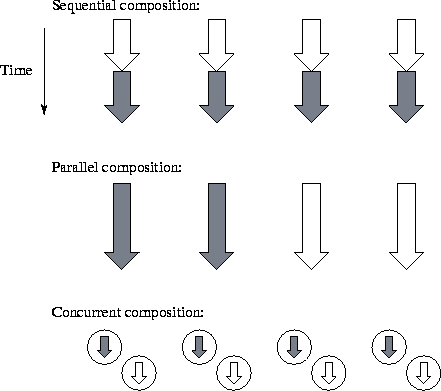Difference Between Sequential And Concurrent
These methods to control thread communication and execution in processes is a critical difference between sequential programming and parallel programming. However, the benefits of parallel computation out way any overheads as multiple threads can get executed concurrently, making it the main difference between sequential and parallel computation. “The Difference between Concurrent. Sequential Computation” and Selected. Papers from EXPRESS'00: 7th International. Workshop on Expressiveness in. In order to signify the differences between the traditional approach of sequential engineering and the modern concurrent engineering approach, I will simulate the release of an aircraft component onto the market, and explain in detail the process. I will point out differences between the methods as I. The type of logic, which can be sequential or combinational. The order of execution of statements, which can be sequential or concurrent. Types of logic. In logic design: A combinational circuit is one that implements a pure logic function without any state.
//create service instance based on params yield return. } I have got a method that calculates some data which is needed to choose the right service instance to create. The estimated parameters are passed to a concurrent method that returns an IEnumerator and creates the service instances. The whole process is repeated several times, since I want to create a bunch of services (loop). My problem is that I have to create the services in a specific order, i.e. First service A, then service B.this means the order given by the for-loop should be realized.
New bollywood movies 2017 download. So, I think SpawnIterator is the wrong approach (maybe use Arbiter.Activate?), since it does not block the execution of the for-loop during runtime. Moreover, I need to pass some parameters to the concurrent method. How can I solve this problem? Yield causes a logically blocking operation, correct, i thought thats what you wanted.

Activate and spawn are the same. They just do this under the covers: _taskQueue.Enqueue(new ITerativeTask(methodName)); basically everything is converted to posting tasks to the dispatcher. On the error, the code snippet is correct, you just need to return IEnumerable from the child method (see this thread) Alternatively, and following the normal practice, just use the Arbter.ExecuteToCompletion primitive and yield to it. Pass it a IterativeTask(method).

Concurrent Processing Vs Parallel Processing
It will return when your iterator is complete or exits at any yield break. I tried your solution and got: Error 1 foreach statement cannot operate on variables of type 'System.Collections.Generic.IEnumerator' because 'System.Collections.Generic.IEnumerator' does not contain a public definition for 'GetEnumerator' Due to your solution, it looks like a 'yield return' is the only possibility to 'block' the execution of the following until all ITasks are complete. So what is the difference between SpawnIterator and Arbiter.Activate(FromIteratorHandler.)? Yield causes a logically blocking operation, correct, i thought thats what you wanted. Activate and spawn are the same. They just do this under the covers: _taskQueue.Enqueue(new ITerativeTask(methodName)); basically everything is converted to posting tasks to the dispatcher. On the error, the code snippet is correct, you just need to return IEnumerable from the child method (see this thread) Alternatively, and following the normal practice, just use the Arbter.ExecuteToCompletion primitive and yield to it.